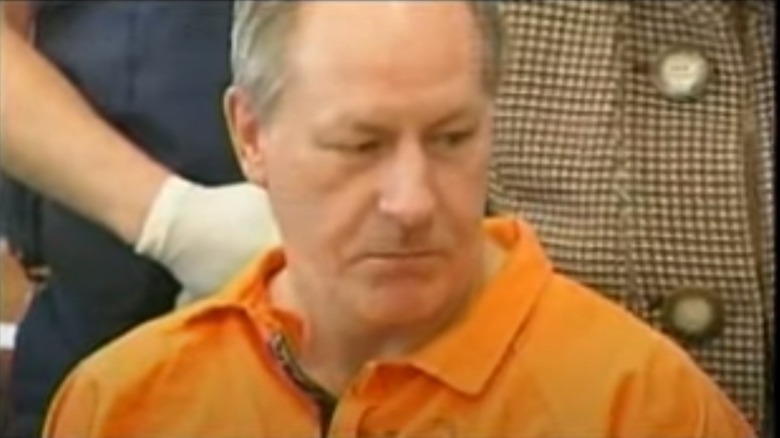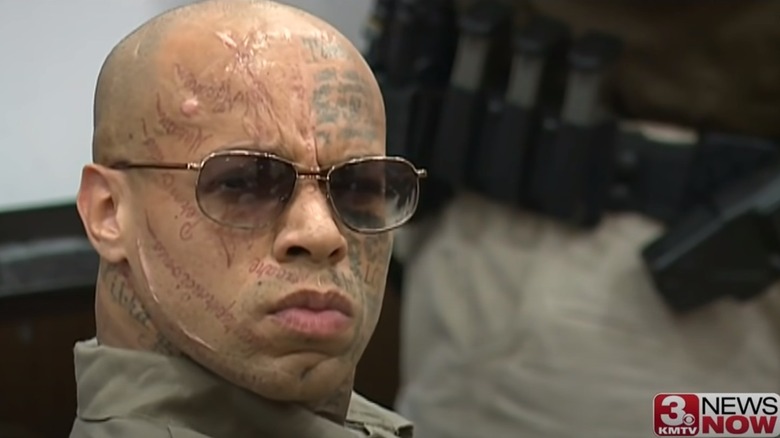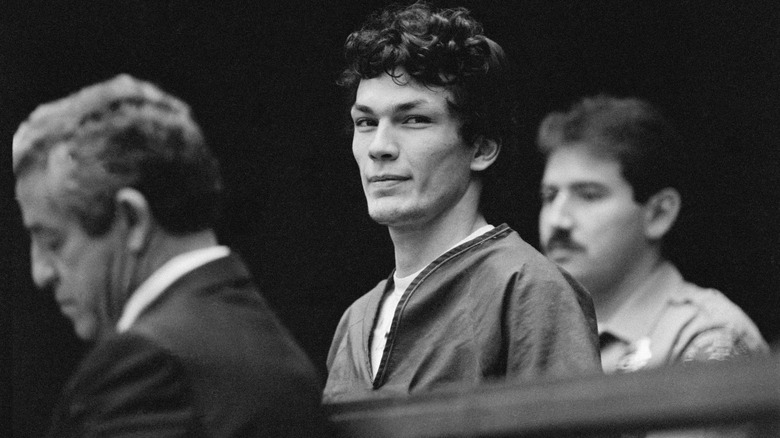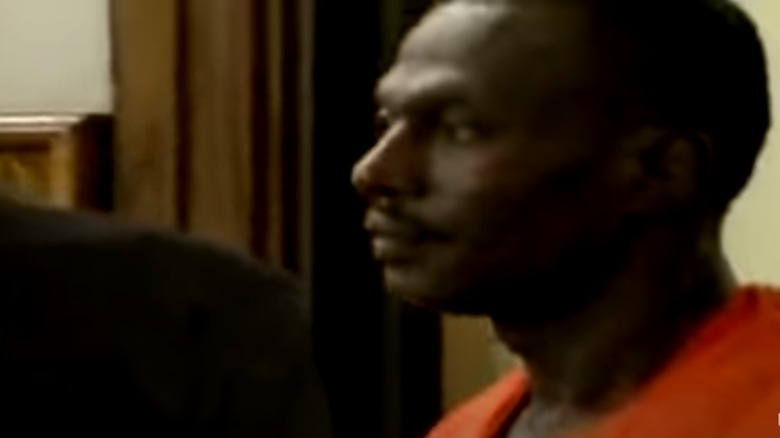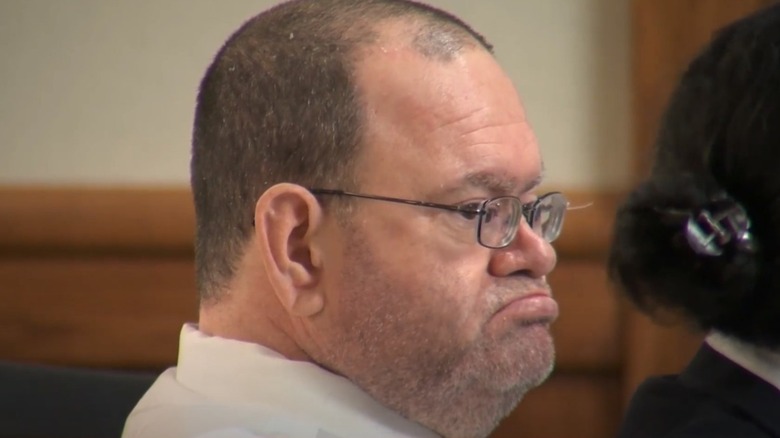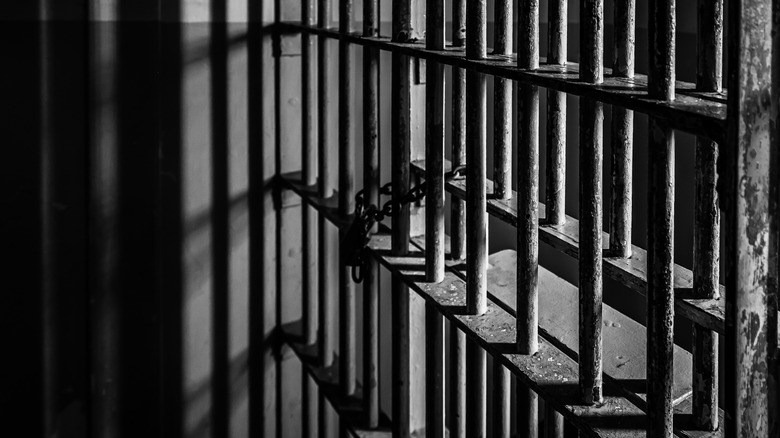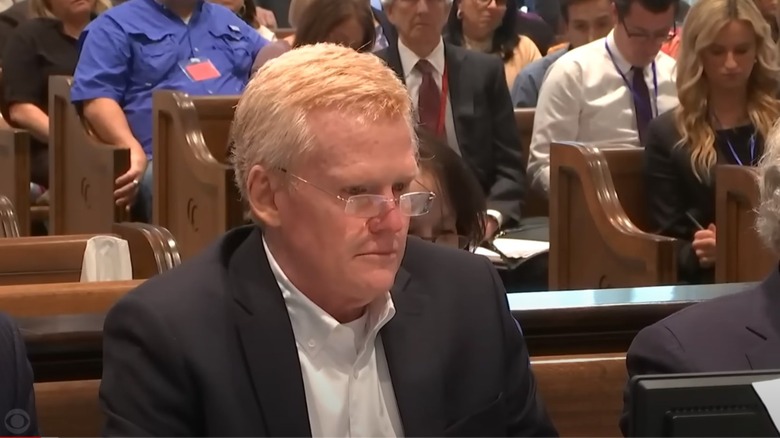Modern Day Criminals With A Sordid Family History
Have there been instances where modern-day criminals have had shocking instances of other crimes buried back in their family tree? Absolutely. While research has shown that genetics might have something to do with a person's likelihood to turn to a life of crime, having genetic markers certainly isn't the only explanation.
A common theme among many violent criminals is transgenerational trauma, which, simply put, is the idea that trauma experienced by someone can be passed down to their family members and future generations. Those traumatic experiences can shape a person towards violence, which then can also be expressed similarly down the familial line. More generally, sometimes the cycle of violence is difficult to escape. Plenty of studies have shown that there's an increased likelihood that children who suffered abuse and neglect or were around criminal activity would become criminals themselves.
Regardless of the explanation, it should come as no surprise that many modern-day criminals had some pretty brutal family history that included parents, grandparents, siblings, and even cousins convicted of some serious crimes.
Robert Lee Yates's grandmother killed her husband with an ax
In 2000, headlines were suggesting that the arrest of an unlikely suspect would bring a serial killer's reign of terror to an end. Since the early 1990s, someone had been killing at-risk women across Washington state, with at least 18 deaths possibly tied to the same killer. When The Seattle Times announced that Robert Lee Yates had been arrested, a childhood friend said, "I don't believe it. I know him too well."
Yates was a military veteran, a married father of five, and a man who was so well-behaved as a boy that his uncle remarked, "If I raised kids, I'd like them to come up as good as him." And then, in exchange for taking the death penalty off the table, Yates confessed to killing 13 women. He was found guilty and sentenced to 408 years in prison, but that wasn't the end of the story.
Yates' full cooperation never came, because prosecutors in one county still went for the death penalty. And here's the thing: The Seattle Post-Intelligencer reports that Yates didn't necessarily just want to live, he wanted something else. He wanted the full FBI treatment, to include genetic profiling to see just what he had in common with his grandmother, who had murdered his grandfather with an ax seven years before he was born. It doesn't seem as though the investigation into his familial relationship to murder ever amounted to much, as there's strangely little information to be found.
From bootlegging during Prohibition to growing pot
When the Courier-Journal asked around about Johnny Boone, they got responses similar to the one given by a Lebanon, Kentucky, garage owner named Joe Rigdon: "Johnny is a helluva good fellow. If you need a dollar, he'll help you out." Boone was well known around town for his charitable donations, but unfortunately, he was also known to law enforcement for being behind some of the largest marijuana-growing operations they'd ever broken up.
In the 1980s, Boone's "Cornbread Mafia" was linked to 29 massive marijuana farms, and after serving 20 years, he was back on the farm again. In 2008, he was once again connected to the drug trade. He fled and eluded authorities until 2016, when he was arrested and pleaded guilty to drug charges.
Boone was profiled in James Higdon III's book, "The Cornbread Mafia: A Homegrown Syndicate's Code of Silence and the Biggest Marijuana Bust in American History." It turns out that the apple doesn't fall far from the tree, so to speak. Finding his abusive father a poor role model, a young Boone had started spending more time with his maternal grandfather, Poss Walker. Walker wasn't just a farmer; he was also a moonshiner and he'd been a bootlegger during Prohibition, which made him more than capable of teaching Boone all he needed to know to skirt USDA laws and hide crops from prying eyes. Boone, it turned out, was a star pupil. He was released from federal prison in 2020.
Nikko Jenkins has a brutal family history
In 2013, Nikko Jenkins made headlines when he was arrested in connection with a killing spree that lasted for 10 days that August and left four people dead. What followed was a series of self-mutilations and questions about Jenkins' competency to stand trial, but he was ultimately given the death penalty (which was reaffirmed by the Nebraska Supreme Court in 2019). His sister, Erica, was also found guilty for her involvement in one of the murders.
Just days after their initial arrest, KETV did a deep dive into the family's history and found that just two generations included seven people who had been convicted of felonies, including making terrorist threats, accessory to murder, and murder. Then, the Omaha World-Herald went even further back in the Jenkins family tree, all the way to Nikko and Erica's great-great-grandfather, Levi Levering. Levering was a well-respected leader of the Omaha Tribe, but his son, Lincoln, had been accused (and acquitted) of beating a man to death in a bar. It was Lincoln, too, who was accused of breaking his wife's back after pushing her off a balcony, but he was hit by a car and killed a few months after that arrest.
Lincoln's daughter, Delphine, was convicted of child abuse, and her sister, Norma Ann, had a robbery conviction on her record. Norma Ann's daughter, Lori, was the mother of Nikko Jenkins and had several nonviolent offenses on her record. She was charged as an accessory to her son's crimes.
Richard Ramirez's cousin was tried for murder
Richard Ramirez really needs no introduction: Carrying out a series of brutal murders that earned him the nickname of "the Night Stalker," he was ultimately found guilty, sentenced to 19 death penalties, and died in prison in 2013. Ramirez grew up in an incredibly abusive home, but it was his cousin who had perhaps the most lasting impact on him.
Philip Carlo's biography "The Night Stalker: The Life and Crimes of Richard Ramirez" took a look at his relationship with his cousin, Miguel. Miguel joined the Army in 1965, ended up becoming a Green Beret, and headed to Vietnam, where he thrived in a place where it was kill or be killed... and mutilating the corpses was just a bonus.
Ramirez's cousin introduced him to some pretty dark things, showing him photos of the women he sexually assaulted at gunpoint, other photos of him holding the decapitated head of one of those women, and the eight shrunken heads he kept under his bed. Then, in 1973, Ramirez got up close and personal with murder. He was at his cousin's house — along with Miguel's two children — when Miguel shot and killed his wife, Jessie. A few days after the killing, Ramirez and his father returned to the scene to retrieve some jewelry, where they found Jessie's blood on the floor and the bullet that killed her. Miguel — painted as a troubled war hero by his attorney — was found not guilty by reason of insanity.
A series of coordinated murders had ties to a Mormon fundamentalist cult
On June 27, 1988, a series of coordinated murders took place. First, three siblings — William Heber, Cynthia, and Natasha LeBaron — shot and killed Mark Chynoweth in Houston. Also in Houston, siblings Patricia and Richard LeBaron killed Duane Chynoweth and his 8-year-old daughter, Jenny. In Irving, Edward Marston was shot and killed by Douglas Barlow. What unfolded afterward was a complicated saga that included the 2010-2011 arrest and sentencing of another sibling, Jacqueline LeBaron, on a conspiracy charge.
The above-mentioned LeBarons were descendants of Ervil LeBaron, the leader of the fundamentalist Mormon cult the Church of the First Born of the Lamb of God, which he started after feuding with his brother, Joel, about who should lead the church founded by Joel and two other LeBaron brothers. Ervil was convicted of Joel's murder in 1974, but the conviction was soon overturned. He was released, and began ordering the killings of other Mormon sect leaders, including Bob Simons in 1975 and Rulon Allred in 1977. In 1979, Ervil was arrested and convicted again. He died in prison in 1981.
After his death, his followers (who mostly consisted of his 50-plus children) continued to follow the instructions recorded in his prison-penned "Book of the New Covenant," which ordered the murders of the Chynoweth family and Edward Marston. It's unclear how many killings there have been, although estimates suggest it's somewhere in the neighborhood of 30. Six more members were indicted in 1992, and in 2019, nine more were killed by a drug cartel in Mexico in an apparently unrelated attack.
If you or someone you know is dealing with spiritual abuse, you can call the National Domestic Violence Hotline at 1−800−799−7233. You can also find more information, resources, and support at their website.
Serial killer Terry Blair isn't a family anomaly
Terry Blair was first arrested and convicted for his pregnant ex-girlfriend's murder in 1982, and while out on parole in 2004, he was arrested again in connection with the murders of six other women. Blair denied the charges, but was ultimately convicted. When his nephew, Diamond Blair, was convicted on charges of second-degree murder in 2013, he became the fifth member of the family to be found guilty of felony charges.
When The Kansas City Star did some digging into Blair's family tree, they found that his mother, Janice, had entered a guilty plea to charges that she had killed her common-law husband. Six months later, her son — and Terry's brother — Walter Jr. was arrested in connection with the shooting death of a 16-year-old boy, but the charges were dropped. He later confessed to shooting and killing a 21-year-old college student, and he was executed in 1993.
Terry's sister, Warnetta, was implicated in another murder, and although those charges were dropped, she entered a guilty plea to the murder of her boyfriend about 10 years later. Older brother Clifford S. Miller was convicted in a case that involved the kidnapping, sexual assault, and beating of a woman, while another brother, Daniel, was arrested multiple times on charges that included assault, robbery, and drug-related offenses. Three of Warnetta's sons also have arrest records.
The Bogle family raised generations of criminals
It's hard to know where to start with the Bogle family, so we'll start with the youngest, Tracey. In 2002, he was in prison on a conviction for rape, assault, kidnapping, robbery, and burglary, telling Pulitzer Prize-winning journalist Fox Butterfield (for The New York Times), "There is a domino effect in a family like ours. What you're raised with, you grow to become. You don't escape." Also in prison at the time were his brother, Robert Zane (on the same charges), and another brother, Tony (on murder charges). Butterfield estimates that the extended Bogle clan has around 60 people who have done time.
This generation credits patriarch Rooster Bogle with their criminal ways. Butterfield says he was first arrested when he was 17, after robbing a grocery store with his siblings and mother. His children would later tell of a slew of crimes undertaken at their father's insistence or with his blessing: There were plenty of drug charges, robbery, domestic violence, and incidents like the one where Rooster's 16-year-old son was taken to a strip club, by his mother, and given his "birthday present." The naked dancer in question? One of his sisters.
That's not the beginning or the end of the story, either. Butterfield has written a book about the family, called "In My Father's House: A New View of How Crime Runs in the Family." In it, he documents the twisting, turning Bogle family tree — all the way back to the Civil War.
Violence ran through the Weaver family
In 2002, Francis Weaver called police and told them that his stepfather, Ward Weaver III, had killed the two young girls that had gone missing from Oregon City. The elder Weaver initially denied the whole thing, until human remains were found in a shed on his property, and another buried beneath a concrete slab. Although both had been believed to be runaways, there was one glaring clue: The missing Ashley Pond had accused Weaver III of attempted rape.
Francis was interviewed on "Good Morning America," saying (via KGW8), "The whole thing just disgusts me. I'd hate to even think that I was brought to this world from a man like that." Fast forward to 2016, and this time, it was Francis who was found guilty of murder (even though he didn't pull the trigger). The victim was Edward Spangler.
Francis actually made not the second but the third generation convicted of murder. When accusations started to swirl around Weaver III, he initially claimed he was seen as a suspect only because his father was the convicted murderer Ward "Pete" Weaver — who had loved to torment his siblings with chains and BB guns. He was accused of rape in 1981, but dodged charges by joining the military. After washing out, returning home, and starting a very unhappy family, he was doing time for rape and attempted murder when he confessed to the murders of Robert Radford and his girlfriend, Barbara LeVoy. He was sitting on death row when Weaver III was jailed.
Elwyn Crocker Sr. was the second cousin of serial killer Pee Wee Gaskins
Warning: This entry contains disturbing descriptions of child abuse.
In 2018, law enforcement discovered the bodies of 16-year-old Elwyn Crocker Jr. and his sister, 14-year-old Mary Crocker, buried behind the family's Georgia trailer. When The Atlanta Journal-Constitution covered evidence put forward in Mary's case, it was heartbreaking stuff: She had been confined to a dog crate, bound with zip ties, starved, beaten, and even tased. Investigators believed Elwyn had predeceased his sister, and added that the horrific treatment of Mary was justified as punishment for offenses like not doing her chores.
Their father, Elwyn Crocker Sr., was arrested along with four others, and his cousin, Israel Pattison, told The AJC, "What happened in Effingham County seems like a reprise of family history." Crocker Sr. would confirm Pattison's stories of childhood abuse. Pattison added that Crocker Sr. had become the abuser himself when he was still young, and that there was one more piece of the puzzle.
Pattison says it's likely that Crocker Sr. overheard conversations about their grandfather's cousin, as he would have been 7 years old when law enforcement started exhuming remains from the shallow graves they'd been buried in, placed there by Donald "Pee Wee" Gaskins. Gaskins confessed to 15 murders in 1978, including those of a pregnant woman and a baby, and things started when he tried to kill his cousin with a hatchet. He was charged with eight deaths, suspected in 39, and executed in 1991.
If you or someone you know may be the victim of child abuse, please contact the Childhelp National Child Abuse Hotline at 1-800-4-A-Child (1-800-422-4453) or contact their live chat services.
The story of Willie Bosket's family goes back generations
Willie Bosket has been behind bars for much of his life, but his life story could fill a book. And it would be a long one: Bosket was sent to a reform school at age 9, where he built up a record of assault, sodomy, and theft. When he was 15, he shot and killed two men on the New York City subway. He was incarcerated in 1984, when he learned his father was in Leavenworth — on murder charges — and started writing to him.
William James Bosket Sr. did some time on the FBI's most wanted list, after committing a double murder when he was 20 years old. Although he went on to get a degree, leave prison, and seemingly turn his life around, he was later charged with molestation, fled, and died by suicide after killing his girlfriend.
Investigative journalist Fox Butterfield decided to write a book about Bosket, and discovered that the Bosket family's history of violence went back much, much further — all the way to 1910. That was when the sharecropper Clifton "Pud" Bosket refused to take a beating from a white landowner, gained a reputation for it, and was arrested after breaking into two stores. His son, James, promised (via the Los Angeles Times), "When I grow up, I'm going to be a bad man, just like my father," and he went to jail for armed robbery. His son was William James Bosket, and it was William's son, Willie, who was called himself a "monster" in 1988 and claimed 2,000 crimes before he was 15.
Alex Murdaugh's son committed manslaughter
In 2023, Alex Murdaugh was given a life sentence after being convicted of the murders of his wife and son. That was just a small part of the charges he faced, which included stealing around $8.8 million from not only his own law firm, but from its clients as well.
Also in the mix was the mysterious death of their housekeeper, who fell at Murdaugh's home in 2018 and died of her injuries. The settlement money awarded to her sons disappeared just as mysteriously. Then, there were the remains of the 19-year-old man found not far from the Murdaugh home, which wasn't ultimately tied to the family, but certainly had the rumor mill churning.
This generation isn't the only one to be associated with murder. Paul Murdaugh, Alex's son, was involved in a fatal boat crash that killed 19-year-old Mallory Beach in 2019. Paul was driving the boat while drunk, and he was also underage at the time. His blood alcohol level was over three times the legal limit. Although Paul was charged with Beach's murder, he was never convicted or even went to trial — Alex murdered him two years later.

